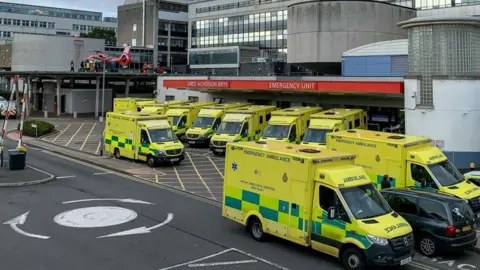Ambulance strike Q&A: Can I still call 999 and 111?
 Getty Images
Getty ImagesAmbulance staff in Wales go on strike on Wednesday as unions call for bigger pay increases.
The most urgent, life-threatening calls will be responded to, as normal and will be exempt from strike action.
But the walkout by GMB union members is expected to affect patient care significantly.
The Welsh Ambulance Service and Welsh government called on people to only dial 999 in a life-threatening emergency.
Who is striking?
Some 1,500 ambulance workers are staging action in Wales on Wednesday.
As the 24-hour strike begins at midnight, shifts which begin at 19:00 GMT on Tuesday will be affected.
Once the strike ends, those on the night shift will be expected to turn up for work as normal from Thursday.
They are also planning to strike on 28 December.
Paramedics as well as control room staff and support workers will all join the walkout.
Why are ambulance workers striking?
The Welsh government has given workers an average pay rise of 4.75%, but with inflation running at more than 10%, unions say this represents a pay cut in real terms.
They are asking for pay rises above inflation, but the Welsh government says it needs more money from Westminster to fund pay rises.
Meanwhile UK government health secretary Steve Barclay, in charge of the NHS in England, says above-inflation pay rises are unaffordable and the unions should respect the independence of the NHS pay review body that proposed the current offer.
The GMB union says the action is also about staff pressure. Members are concerned they are unable to deliver safe standards of patient care due to shortages, the union has said.
Can I still call 999?
Calls will still be answered, so those on shift in the call rooms are exempt from strike action.
Fewer ambulance crews will be available but callouts for life-threatening emergencies will still be responded to.
Speaking on Monday's Radio Wales Drive programme, Darren Hughes, from the NHS Confederation in Wales, said ambulances would be under "huge pressure" during the strikes, and would "struggle to respond to chest pain [and] gynaecological emergencies" for example.
Wales' health minister Eluned Morgan said red category life-threatening calls will be prioritised but added that people "need to consider" pressure on other calls "will be even greater".
The Welsh Ambulance Service is asking people to only call 999 when there is a genuine need to do so. Only life- threatening illnesses or injuries are likely to receive an emergency response. Other patients are likely to be asked to make their own way to hospital, the service says.
What about 111?
The NHS Wales 111 advice line will also be affected by the strike and the Welsh Ambulance Service is warning to only dial the number if it's absolutely necessary.
Patients may have to wait longer to be assessed and to receive a call back, the Welsh Ambulance service says.
Patients are being advised to consider alternatives like their GP, pharmacist, NHS 111 Wales online or a Minor Injuries Unit if they need medical help. The ambulance service also said people should stock up on prescription medications and over the counter remedies to reduce the risk of falling ill on strike days.
